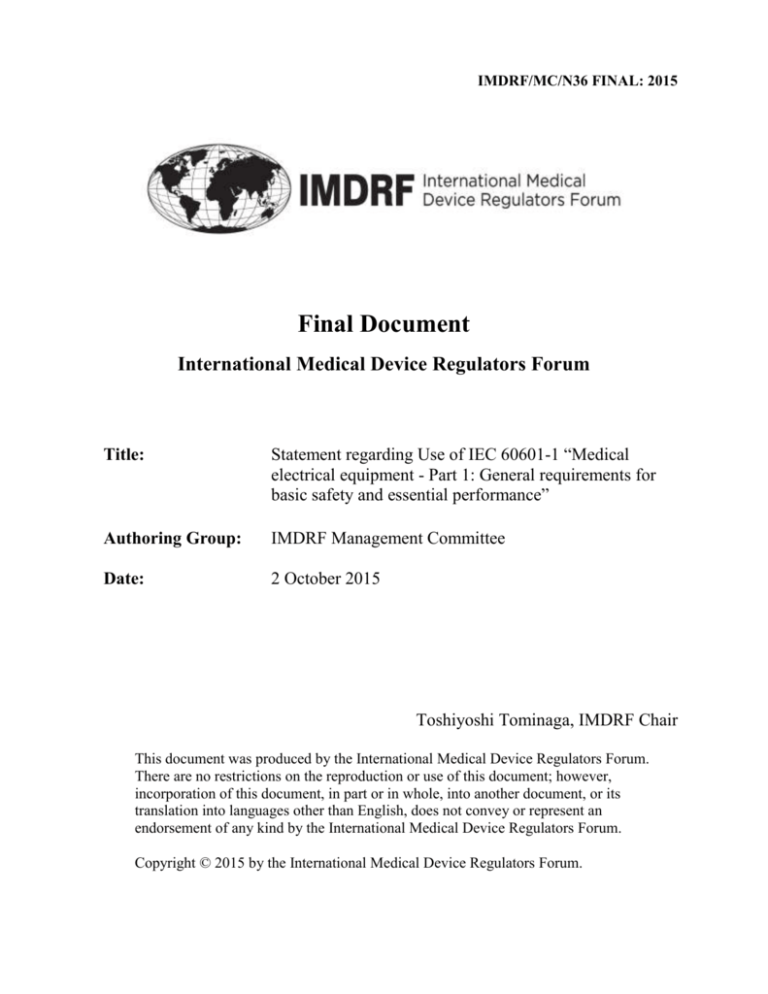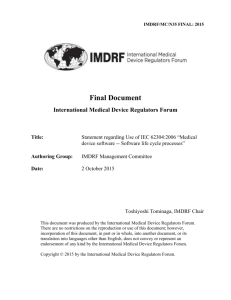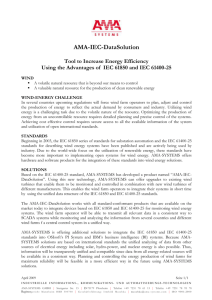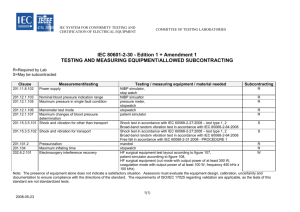Medical electrical equipment - Part 1: General requirements for basic
advertisement

IMDRF/MC/N36 FINAL: 2015 Final Document International Medical Device Regulators Forum Title: Statement regarding Use of IEC 60601-1 “Medical electrical equipment - Part 1: General requirements for basic safety and essential performance” Authoring Group: IMDRF Management Committee Date: 2 October 2015 Toshiyoshi Tominaga, IMDRF Chair This document was produced by the International Medical Device Regulators Forum. There are no restrictions on the reproduction or use of this document; however, incorporation of this document, in part or in whole, into another document, or its translation into languages other than English, does not convey or represent an endorsement of any kind by the International Medical Device Regulators Forum. Copyright © 2015 by the International Medical Device Regulators Forum. IMDRF/MC/N36 FINAL: 2015 Use of IEC 60601-1 “Medical electrical equipment - Part 1: General requirements for basic safety and essential performance” in each jurisdiction Australia Therapeutic Goods Administration (TGA) Brazil National Health Surveillance Agency (ANVISA) Canada Health Canada (HC) All medical devices are required to meet Australian Essential Principles (EPs). IEC 60601-1 (or equivalent or better), IEC 606011-2 General requirements for basic safety and essential performance - Collateral standard: Electromagnetic compatibility Requirements and tests are referenced in the supporting data form. Compliance with these standards is used as evidence of compliance with the EPs. It is mandatory for manufacturers and importers of medical devices to prove that they have met IEC 60601-1requirements. Trials are performed to the majority of medical devices so as to ensure the standards have been applied, specially in the pre-market stage. In Canada, conformance to specific standards is not mandatory. However, evidence of conformity to recognised standards can be submitted to demonstrate that specific requirements of the Medical Devices Regulations have been met. HC publishes a list of recognised standards, and the level of evidence expected is “equivalent or better” to these recognised standards. IEC 60601-1 is currently a recognised standard. It is important to note that electromedical devices used in Canada must also obtain an electrical safety mark, as defined by the Canadian Electrical Code (CEC). The CEC is separate and distinct from the Medical Devices Regulations and is mandated by Provincial and Territorial electrical safety authorities, not by Health Canada. China The CFDA had translated the IEC 606011:1988+Amd1:1991+Amd2:1995 into china national standard: GB China Food and Drug 9706.1-2007 equally and implement from 2008.7.1, we had the plan Administration (CFDA) to revise the national standard GB 9706.1-2007 according to the new version of the international standard-IEC 60601-1:2012, the revision project had been approved by SAC, and CFDA is organizing the relevant standard technical committee to draft the documents, we hope to submit the documents to SAC on 2016, then the SAC will approve the standard according to the process. The standard will be mandatory standard. Europe The corresponding European standard EN 60601-1:2006 is a harmonized standard which provides presumption of conformity European Commission with certain legal requirements on the safety of medical electrical (EC) equipment. The use of this standard (to the extent specified in its Annex ZZ) 2 October 2015 Page 2 of 3 IMDRF/MC/N36 FINAL: 2015 Japan Ministry of Health, Labour and Welfare (MHLW) Pharmaceuticals and Medical Devices Agency (PMDA) Russia Russian Ministry of Health Roszdravnadzor The United States of America US Food and Drug Administration (US FDA) 2 October 2015 provides one solution for compliance with the relevant legal requirements. Compliance with the legal requirements can however be ensured also by other means. All medical devices are required to satisfy the EPs that align with those defined in GHTF/SG1/N68:2012 Essential Principles of Safety and Performance of Medical Devices. IEC 60601-1 can be used for its purpose, especially in case of active medical devices, which is clearly referred to in checklist of EPs or certification/approval standards for each medical device. In current regulation using of standards is voluntary in premarket MD evaluation. And Regulator does not recognize any standard which could provide presumption of conformity. But when on the market, some types of MD have to be certified for particular mandatory standards (list of mandatory standards and types of MD is available on Regulator’s web site). It should be noted, that this regulation is to be canceled on 01/01/2016. 60601-1-6 Edition 3.1:2013 is recognized by the US FDA medical device program as a consensus standard for which a person may submit a declaration of conformity in order to meet a premarket submission requirement or other requirements to which a standard is applicable. This safety standard covers both traditional basic safety and essential performance aspects for patient connected medical devices. US FDA recognizes IEC 60601-1 Edition 3.1:2013 as providing a verifiable yet comprehensive framework for the use and selection of hazard mitigation techniques through its use of many specific device types in several risk domains, and the inclusion of many technological areas. The more than 40 member standards within the overall framework are recognized individually. Normative requirements appearing in the standard arising from other standards not within the standard’s framework are themselves frequently recognized by FDA. Page 3 of 3





